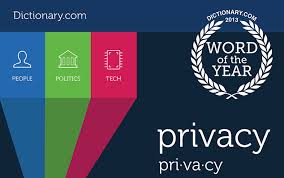Data Privacy Expert on the Irony of Dictionary.com’s Word of the Year

Dictionary.com has chosen its “word of the year”. Thank the etymological gods it’s not selfie, twerk or hashtag. No, this year’s most relevant, most searched word is:
Privacy.
Call me geeky, but this is happy news to privacy experts, because it raises consciousness that this stuff (your right to keep certain information to your self) actually matters.
And consciousness has definitely been raised in 2013:
- Data security and privacy experts everywhere should thank Edward Snowden for exposing the NSA surveillance programs that monitor every American’s phone calls, Facebook posts and emails for signs of terrorism (and any other data they care to intercept).
- Thanks to SnapChat for making deleted photos recoverable (despite claims they disappear).
- Additional kudos to Google Glass for raising awareness on how easy it is to capture intellectual property as criminals videotape their way through Fortune 500 offices, record ATM PIN numbers of the bank customer in front of them and deploy instant facial recognition software in a variety of social engineering schemes.
- And in the Coup de Grace of 2013, bonus points to Target for playing the Grinch in a massive holiday breach that exposed 40 million of their customers’ records (customers who actually shopped at Target, not online).
Here’s the ironical twist to the word of the year: Dictionary.com violates your privacy at a standard higher than most other websites. You thought you were just looking up a word, right? Wrong – you are creating a traceable behavioral profile that can be sold to marketing firms worldwide. For example, when you type a word into Dictionary.com, your “surfing profile” is immediately sold to 234 additional websites before you’ve even read the full definition. So when your daughter looks up “bankruptcy” while doing a term paper for high school, Chase Bank buys that information, scores you as a high risk candidate for financial default and, the next time you apply for a credit card, redirects you to a web page offering you a considerably higher annual APR. Brilliant, no? See more examples in my post Big Brother Lives in Your Browser.
I don’t want to look a gift horse in the mouth, however (well, maybe a little). Thank you to Dictionary.com for reinforcing the relevance of data privacy issues that quietly affect every one of us every day. Now, if privacy experts could just get Dictionary.com to include a definition of data privacy that accounts for the idea of consent (that we get a choice of what to share and who to share it with), that would be real progress. In other words, data privacy is a matter of degree, not all or nothing.
John Sileo is an author and keynote speaker on privacy, identity theft and technology security. He is CEO of The Sileo Group, which helps organizations to defend the data that drives their profitability. His recent engagements include presentations at the Pentagon, Visa, Homeland Security and Northrop Grumman as well as media appearances on 60 Minutes, Anderson Cooper and Fox Business. Contact him directly on 800.258.8076.
Sorry, comments for this entry are closed at this time.









No Comments Yet
You can be the first to comment!